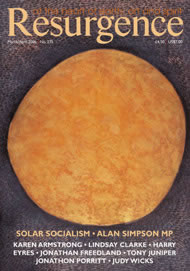EVERY SO OFTEN you come across a book that captures the wonder and sensuality of the natural world and our relation to it. The writing has about it the resonance of some exceptional sense of meaning, the kind that you occasionally gather a glimpse of in life but which more usually remains just beyond your grasp. When you come across such a piece it’s like finding a treasure. It fills you with the sort of elation the beachcomber feels gazing along the waterline and seeing, as a wave sweeps out, the unmistakable edge of an ancient golden coin in the sand. Findings, by the Scottish poet Kathleen Jamie, is just such a book.
Jamie traces a loose course around Scotland and its islands where she lives with her family and where she has a place, among other things, as professor of creative writing at St Andrews University. The book takes the form of meditations on a wide range of natural phenomena: the positioning of an ancient burial ground or the mating habits of peregrines, the curious markings left on the landscape by long-lost ancestors or the disappearing habitat of the corncrake. She takes each experience and turns it subtly by interweaving the feelings, thoughts and experiences from her own life to form expressions of an elusive kind of universal understanding. The choices she makes in selecting her subjects and the focus of her themes are so subtle and seemingly random in comparison with more obvious styles that it becomes difficult to place the work itself. Is it poetry, or is it prose? I believe it lies ingeniously in between, benefiting from the best of both.
Jamie achieves that hallowed height of a writer’s ambition: the quality of slowing time in the depth of her observation to bring a new perspective on things we normally take for granted. She does this without slipping into the dull or pretentious. It’s a delicate balance that can easily founder: lush adjectives bloom with affected determination; the natural becomes the studied, the meditations more like pompous lectures. No need to be afraid of that here. This is a realm where “The sea and its surf is never far away, a constant Atlantic soughing, a sense that the land is an interruption in a long conversation between water and sky.” Where, “after the rain, two full days of it, came a day so bright and washed clean, everything was rinsed: the sky and trees, gutters and windows, even the splashes of bird lime below the peregrines’ ledge were washed away. In the clean air the male falcon himself looked sharper, his grey back was sleek, his beak and talons buttercup-bright.”
Reading such sentences you find yourself jealous of her restraint, her ability to look and listen to all that passes around her with such discipline and attention. You feel as if she has introduced you to hidden secrets. Your surprise and interest are doubly piqued in the understanding that much of what she observes would be just as visible to you if you were not rushing along too quickly to notice. Most admirably she does not try to offer resolution in the deeper focus of her thoughts. She leads you in riveting detail over gale-battered beeches, along rivers brimming with salmon, past shelves at Surgeons Hall in Edinburgh loaded with anatomical specimens. All the while you wonder where she is going, how layers of further meaning might appear through the observation and the delicate, simple language. Finally, with a deft turn of association, she reveals a richer kingdom of ideas and feelings before walking out of view, leaving you to run on alone, brimming with your own impressions of our way of life and its vital correspondence with nature.
Perhaps the most important thing is that the feelings and ideas Jamie evokes are comfortingly familiar, though you can’t quite place how because they are at the centre of the way we all experience things. The light and space in her world of remote islands, low sunsets, gabbing birds and rushing waters is soothing in a way that cannot but touch you to the quick. You find yourself consoled by nature and attuned in a way we are rarely able to achieve amid the perpetual distraction of the modern Western world. She charts the courses in life we find hardest to deal with – loss, age, illness and death – with a grace that allows you to breathe while you navigate their waters. You are left with a longing to continue in the harmony and vision of the world she conjures; elated in the knowledge that such richness is there before you if you stop, breathe, listen and look.
Ulric van den Bogaerde is author of The Unexpected Visitor.







